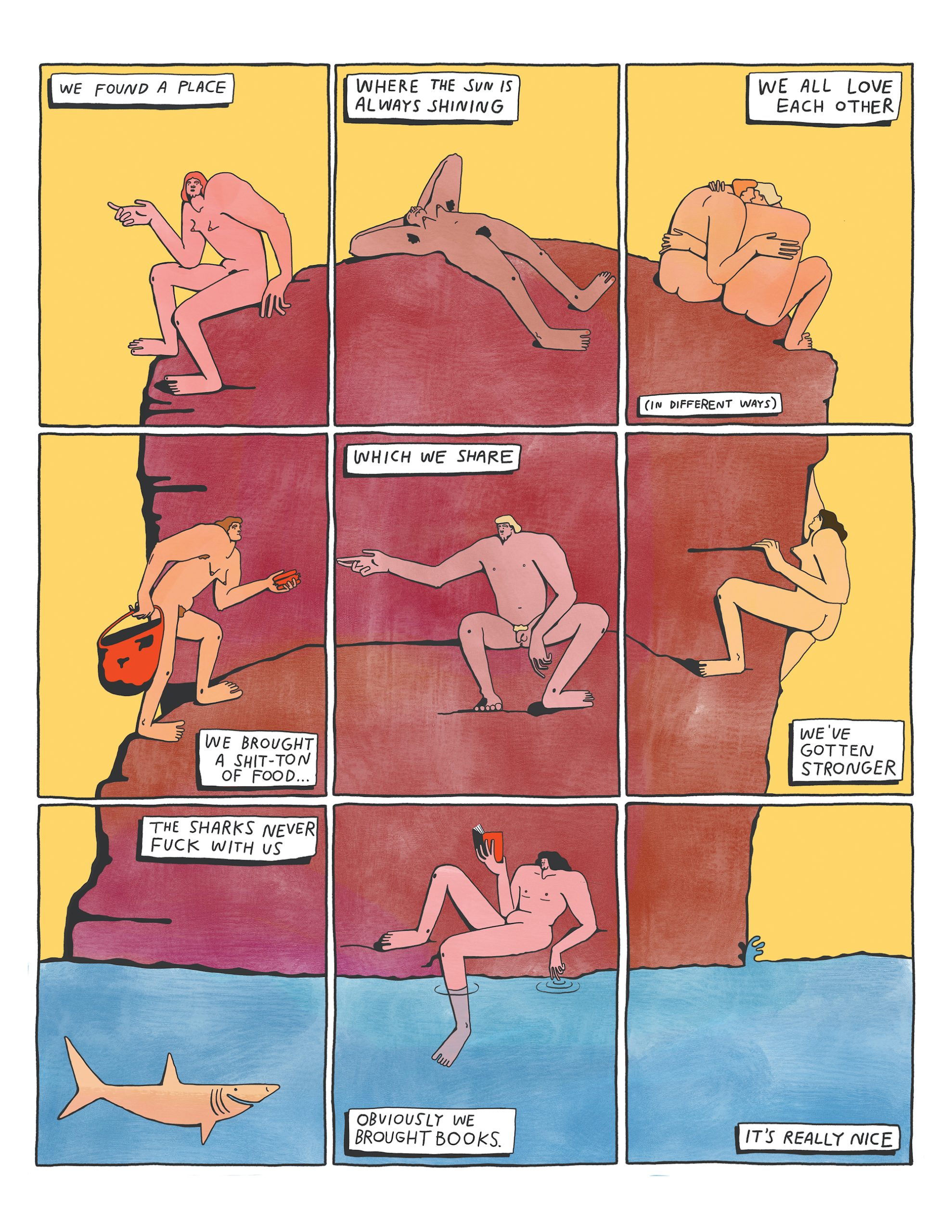On April 1, 2020, it was abundantly clear that New York City was, by all definitions, not OK: Schools, bars, restaurants, and other businesses deemed “non-essential” had suspended operations weeks prior as the COVID-19 death toll steadily climbed. Gabe Fowler, sole proprietor of Desert Island, the legendary Williamsburg comic shop, had shuttered its doors and hightailed it out of the city (in his case, to a cabin in Connecticut). Feeling isolated and terrified — the seemingly dominant emotional state at the time — Fowler put out a call via Desert Island’s Instagram account: “We all need something positive to think about, and lots of us have time on our hands,” the post read. “Who wants to make something?”
Rescue Party: A Graphic Anthology of Covid Lockdown (2024) is the result of Fowler’s invitation. Newly published by Pantheon Books, it presents a selection chosen from the over 250 responses Fowler received from more than 50 countries. It also includes warmly personal yet incisive essays by both himself and Hillary Chute, a literary scholar whose prolific writings on the genre (including Graphic Content, her column in the New York Times’s Book Review section) have helped define and defend the form within and beyond the confines of academia.
Fowler imposed just a few constraints on his would-be contributors: Submissions mustn’t exceed a standard 9-panel format, and the outlook should be if not positive, then forward-looking at least. Rescue Party is about a shared imagination of what a future beyond COVID-19 might hold.



As a book, and a visually distinctive one at that, Rescue Party feels like both a celebration and a memorial: We made it. The “we” here is both self-selecting — Fowler and Desert Island are part of a tightly-knit, if wide-ranging creative community — and somewhat universal, as the resulting works are wildly expansive in nature, formally and culturally. Individually, the comics are delightfully dreamy testaments to that scary, suspenseful moment in time — and to hope itself. Its message, as a result, is timeless — more relevant than ever.
Whether doomscrolling social media or chatting with colleagues and loved ones in what felt like one neverending Zoom meeting, many if not most of us witnessed the pandemic through digital interfaces designed, owned, and operated by a handful of major tech companies. If one object effectively embodied the acute sense of individualized alienation felt by so many in the year 2020, it is the iPhone; if one digital platform allowed us to visually document and self-publish our own pandemic experiences, it is Instagram. At Desert Island, Fowler runs a pretty tightly engaged, if totally indie social media operation. Rescue Party is, in a sense, “born digital,” as its 9-panel format posts perfectly to Instagram’s grid, forming a series of narrative arcs in real time for the shop’s approximately 145K followers.
Ultimately, Rescue Party conjures a series of questions, some perennial, about and around form. These provocations remain as existential in nature as the pandemic itself: Why does the grid — as well as the physical book — persist as the preferred format for comic artists? What new, novel possibilities does the present-day Internet, in all of its horrors, hold for comic creators in 2024? What gets lost in translation, experientially speaking, when digital is translated into print — and vice versa? Did Rescue Party really need to be transformed into a book at all? The party, it seems, isn’t over yet.



Rescue Party: A Graphic Anthology of Covid Lockdown, edited by Gabe Fowler and published by Pantheon Books, is available for purchase online and in bookstores.

